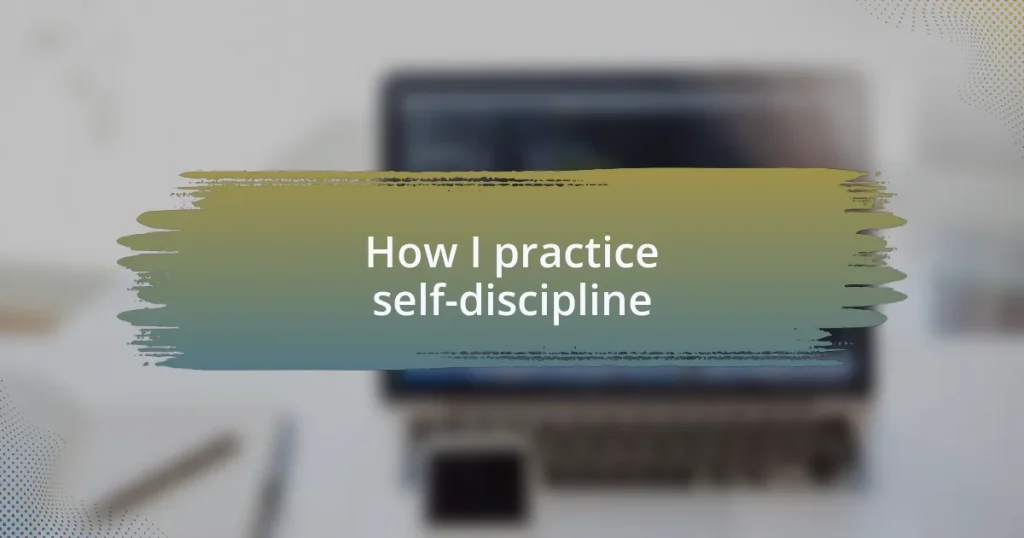Key takeaways:
- Self-discipline is essential for web developers to manage tasks, set clear goals, and maintain focus, especially under tight deadlines.
- Breaking projects into smaller, manageable tasks and creating a distraction-free workspace significantly enhances productivity and motivation.
- Regularly tracking progress, celebrating small victories, and reflecting on successes and setbacks fosters continuous improvement and growth.
Author: Charlotte Everly
Bio: Charlotte Everly is an accomplished author known for her evocative storytelling and richly drawn characters. With a background in literature and creative writing, she weaves tales that explore the complexities of human relationships and the beauty of everyday life. Charlotte’s debut novel was met with critical acclaim, earning her a dedicated readership and multiple awards. When she isn’t penning her next bestseller, she enjoys hiking in the mountains and sipping coffee at her local café. She resides in Seattle with her two rescue dogs, Bella and Max.
Understanding self-discipline in web development
Self-discipline in web development is crucial for managing the myriad tasks that come with building and maintaining projects. I remember when I first started out; I often found myself overwhelmed by the endless learning curve. It raised a question in my mind: how do I stay focused and organized to make real progress?
I’ve learned that setting clear goals can significantly enhance your self-discipline. Just last month, I decided to break down a larger project into smaller, manageable tasks with deadlines. This not only kept my motivation high but also allowed me to celebrate small victories along the way. Do you ever find that achieving these little milestones makes the entire journey feel less daunting?
Moreover, creating a dedicated workspace has been a game-changer for my self-discipline. When I moved my setup to a distraction-free environment, I noticed an impressive boost in my productivity. I often ask myself: how can we better structure our surroundings to foster focus? It’s an ongoing experiment, but I genuinely believe that these adjustments have made my web development process smoother and more enjoyable.
Importance of self-discipline for developers
Self-discipline is essential for developers because it directly influences our ability to deliver high-quality work. For instance, when I set aside hours to learn a new framework or language, I find that sticking to a schedule transforms a chaotic learning process into a structured journey. Have you ever noticed how time spent consistently practicing leads to faster skill acquisition?
Moreover, self-discipline becomes particularly important when facing tight deadlines. I recall a project where I had to manage multiple tasks alongside unexpected bugs. By maintaining focus and adhering to my priorities, I not only met the deadline but also ensured that the quality of my code didn’t suffer. In those moments, I ask myself: how would I handle similar situations without self-discipline?
The ability to delay gratification is what sets successful developers apart. I remember being tempted by distractions, like social media, when I had critical tasks at hand. By consciously choosing to work on my project instead, I found a sense of accomplishment that far outweighed the instant gratification of scrolling through my feed. Have you experienced that rewarding feeling of knowing you chose focus over distraction? It’s moments like these that reinforce my belief in the power of self-discipline in our field.
Strategies to improve self-discipline
One strategy that has profoundly improved my self-discipline is setting specific, measurable goals. For example, I recently decided to learn JavaScript by completing a coding challenge every day for a month. This commitment not only offered me tangible progress but also created a sense of accountability—every completed challenge was a small victory that fueled my motivation. Have you ever found clarity in defining your goals so precisely?
Another effective approach is to minimize distractions in your workspace. I used to struggle with notifications from my phone, but I realized that putting it on ‘Do Not Disturb’ during focused work sessions significantly enhanced my productivity. I often wonder how much I could achieve if I consistently protected my time from interruptions. Have you tried creating an environment that fosters concentration?
Finally, creating a daily routine around self-discipline can yield remarkable results. During my busy times, I carve out periods in my day specifically for deep work. Initially, it seemed challenging, but over time, that regularity transformed my approach to tasks, making me less susceptible to procrastination. Do you have a routine that helps you stay on track, or are you still searching for that perfect rhythm?
Setting achievable goals for projects
When setting goals for your projects, I find that breaking them down into smaller, manageable tasks is essential. For instance, when I worked on my first web application, I divided the project into phases—designing the layout, writing code for functionality, and testing. This approach not only made the project less overwhelming but also allowed me to celebrate small victories along the way. Have you ever experienced that rush of accomplishment by ticking off tasks from a list?
Another key aspect is ensuring your goals align with your overall objectives. I remember a time when I aimed to learn React, but set my sights too high by planning an entire app in a week. Once I adjusted my goal to focus on understanding components first, I felt more engaged and confident in my progress. This shift taught me that goals should be reflective of our skills and current workload. What have you learned from adjusting your goals to better suit your situation?
Lastly, it’s crucial to regularly assess your goals as you progress through your projects. During a recent project, I made it a habit to review my goals at the end of each week. This reflection often revealed areas where I needed to pivot or adjust my focus. It’s fascinating how these small adjustments can lead to significant improvements in outcomes. How often do you take the time to evaluate your goals, and what insights have you gained from those reflections?
Tracking progress and staying motivated
Tracking progress is an essential step in maintaining motivation, and I’ve found that keeping a visual representation of my journey makes a world of difference. Whether it’s a simple checklist or a more elaborate project management tool, seeing my tasks completed gives me a sense of accomplishment. Have you ever noticed how crossing off even the tiniest item from your list can boost your spirits?
Another effective method I’ve adopted is maintaining a progress journal. Reflecting on my daily or weekly achievements allows me to recognize not just what I’ve completed but also how far I’ve come. For example, after finishing the initial coding phase of my latest project, I took a moment to jot down my thoughts and feelings about the challenges I’d overcome. That reflection not only reinforced my commitment but also kept me excited for what was next. Does writing about your experiences help you stay motivated?
Lastly, celebrating milestones, no matter how small, is crucial in sustaining my enthusiasm. I often reward myself after completing significant tasks, like taking a short break or treating myself to something nice. It’s like giving myself a pat on the back, ensuring that I stay engaged in the long run. Have you considered how rewards could potentially elevate your motivation levels? By celebrating these moments, I find that they serve as markers of progress, reinforcing my drive to tackle the next challenge head-on.
Reflecting on successes and setbacks
Reflecting on my successes and setbacks has become an invaluable part of my self-discipline practice. When I encounter a challenge, I take a moment to dissect what went wrong and how I can improve. For instance, early in my career, I misjudged the time needed for a project, which led to a stressful last-minute scramble. This experience taught me the importance of realistic planning, and to this day, I prioritize time management to avoid similar pitfalls.
On the other hand, celebrating successes can often feel like a rare luxury amid the chaos of web development. I vividly remember the thrill I felt after launching my first fully responsive website. I let myself bask in that moment, realizing that success is not just about the end product but also about the hard work and learning that led to it. Have you ever paused to appreciate your victories? Those moments of acknowledgment fuel my confidence and remind me that setbacks are merely stepping stones along the way.
Moreover, it’s essential to maintain balance in this reflection process. I sometimes create a ‘lessons learned’ list, where I jot down what worked well and what didn’t. This practice has transformed setbacks into learning experiences, allowing me to approach future projects with a growth mindset. When I look at these notes, it feels like I’m nurturing my development rather than simply tallying failures. How do you process your own challenges? Turning reflection into a constructive tool has made all the difference for me.















